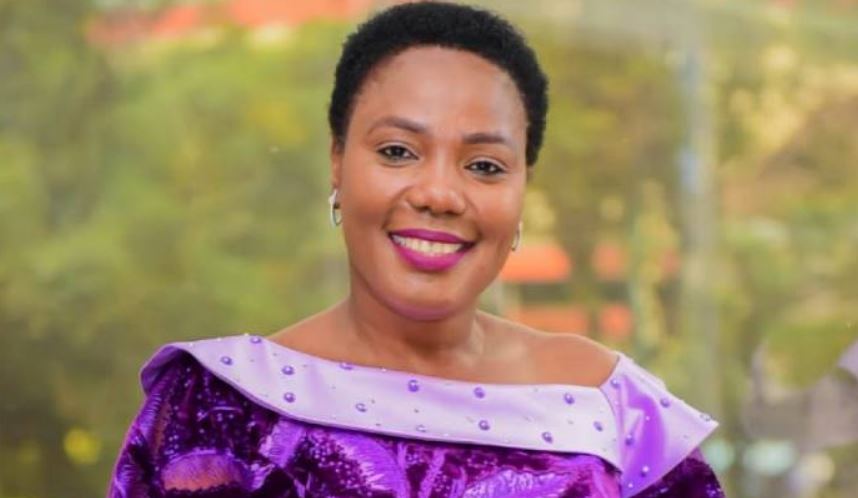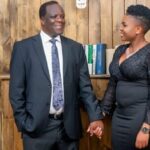 Gospel artiste Sarah Njeri Mwangi, alias Sarah K, recently celebrated her 50th birthday. She spoke to The Nairobian.
Gospel artiste Sarah Njeri Mwangi, alias Sarah K, recently celebrated her 50th birthday. She spoke to The Nairobian.
You celebrated your 50th birthday earlier this year. What is your greatest testimony as you look back?
Turning 50 is not a small matter and I’m looking forward to living many more years. I was grateful to have turned 40 because they say life begins at 40. Every year is important; there is no guarantee of how many years we get to live. At 50, I’m thanking God for everything He has done for me. At 50, I look good; I think women should love themselves the way they are. Don’t fear age.
You look much younger than your age. Could you kindly share secrets to your beauty?
I don’t have any secrets to share because I haven’t put any effort into it. I have only been to a gym for less than a month because of Covid-19-related lockdowns. I felt I was adding weight. I became cautious and I decided to go cut some weight.
How do you respond to hunger or the urge to eat?
You can’t punish me with food. I eat when there is food. Tea and bread is my all-time best. In fact, I can’t do without bread. I don’t know what I would do without bread.
What is the most important thing you have learnt about life?
It is very important to exercise patience. In everything we go through, patience is key. By exercising patience, we nurture peace and joy.
What would you tell your 20-year-old self?
I would tell her to be patient. Had I known the things I know today, I would just sit back and be happy because God is in control. For 18 years, I sang without getting a breakthrough. I sang far and wide but I was still struggling. I felt I was not going anywhere. Other artistes kept asking why I didn’t get a breakthrough despite the fact that my music was great. I got my first award in 2014, yet I launched my singing career in 1991.
How was your upbringing?
I was born in Nairobi. I went to Baba Dogo Primary School. We later moved to Kiambu, then to Loitoktok where I lived most of my childhood life. Life was good but challenging, having come from Kikuyuland. This new environment had a lot of people speaking Kiswahili. My parents were business people, so we moved a lot.
What is your best childhood memory?
It is the benefit that I got from the Kenya-Tanzania border. Growing up in this environment helped me spruce up my Kiswahili, enabling me to sing well in it. Maybe if I were still in Kiambu, I would be singing only Kikuyu songs. I sing Kikuyu songs but I am not able to compose them well. I get motivation in Swahili, then I translate into kikuyu. I am proud of this childhood experience. My stay in Loitoktok benefited me and is still crucial to date.
How do you relate with your siblings and children given your national fame?
I always draw a line between what I do and family. I don’t expect my family to celebrate me like fans do. When I go home, I behave like a sister, a daughter, a mother and a wife. I do what mothers do. The values I give are fear, love and service to God. The same message my mother gave me. Two of my sisters are pastors and my younger brother is a pastor and an artiste and produces my music.
You hinted at struggling with esteem issues. Please tell us more.
People speak things about us and they stick to our minds. My house-help called me ugly; she compared me to my siblings and said I was the ugliest. That is how it all came about.
What would you say to that house girl today if you happen to bump into her?
(Laughs!) I would laugh and tell her she was very wrong. But I will tell her it was okay she did that because that is what I was then. I would not be angry at her. God takes us from one glory to another. I got married in 1991. If you saw my photo then, you would realise I looked older than I am today.
How did your parents’ separation affect you?
It affected me so much! Then, I didn’t understand what separation was. During our time, such things were unheard of. We are left in a dilemma to choose which parent to go with. It affects children even in their later life.
In your case, how has it impacted on your understanding of marriage?
It affects me because they are not together. Visiting one parent and then another is a lot. I need blessings from both my parents. I saw my parents fighting as a child, so at the beginning my idea of marriage was corrupted. I started contemplating running away if my husband ever pointed a finger at me. I later prayed to God and made it clear that I’m not my parents. It is wrong to keep quiet when you feel things are not right.
Is there something you wish your parents did differently?
Yes. I wish they had been a little tolerant and patient with each other. If they had been patient and tried to understand each other, things would have been different.
So what happened to you after your parents parted ways?
I dropped out of school. I worked in tea farms where my mum was picking tea leaves for a wage to send my younger siblings to school. I then worked in a construction site doing all kinds of manual labour. I later became a house-help, earning Sh400 per month. I would give my mother Sh100, use another Sh100 for my upkeep, another Sh100 would cater for my fare to and from work while the remainder went to buying her shopping.
What had you dreamed of becoming professionally?
I wanted to be a fashion designer. The only thing I did well was drawing beautiful dresses. I had an eye for beautiful clothes and since I couldn’t afford, I just looked and admired them. I gave it a try and went to a technical school to do tailoring. That was the closest I came to living my dream. So the music came and took away the dream. I always knew I was a singer, I led in singing during Sunday school days.
What challenges did you face starting up your career?
I was turned down many times. People said I had a very masculine voice. So I would go home pray and cry to God for a better voice. One day, my producer R. Kay, advised me to sing in my voice. He made me believe in myself and accept my voice.
You used to shy away from TV interviews. How did you overcome that?
I turned down so many interviews because of poor education. I didn’t think I could speak English well. I was also bothered by the idea put in my head that I was ugly. I thought people would judge me. I went once and everyone was telling me how good the interview was, and just like that, I overcame it.
What are some of the awards you have won?
My song Liseme has won an award. I’ve also been awarded the Best Female Artiste of the Year and Song Writer of the Year, among others.






